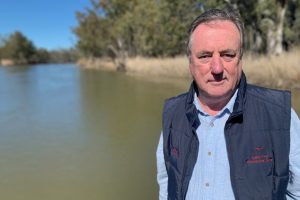05 May 2020
Keelty report into Murray-Darling Plan angers irrigators
Keelty report into Murray-Darling Plan angers irrigators
5 May 2020
The impact of reduced rainfall over the last two decades was “the most telling finding” from the latest report into the Murray-Darling Basin Plan.
‘Impact of lower inflows on state shares under the Murray-Darling Basin Agreement’ was prepared by Mick Keelty, the Interim Inspector-General of Murray Darling Basin Resources, and released last month. The report can be read in full here.
Federal Agriculture Minister David Littleproud (who was then the Water Minister) requested the inquiry in response to the ‘Can the Plan’ protests in front of Parliament House in December.
The protesters called for an end to the MDBP saying it resulted in “the mismanagement of the rivers, water being wasted and flushed out to sea, too much water being taken from farmers for the environment, and state governments using the opportunity to ‘play politics’.”
The two matters investigated by the Interim Inspector General were:
- The impact of changing distribution of inflows to the southern Basin on state shares under the Murray–Darling Basin Agreement; and
- Any consequential impacts on state water shares resulting from reserves required under the Murray–Darling Basin Agreement. This includes how these interact with state water allocation policies.
Mr Keelty held eight town meetings throughout the southern Basin attended in total by approximately 1000 people, including in Renmark, Mildura, Swan Hill, Griffith, and Shepparton. He also interviewed 80 people and received 345 submissions.
In his foreword, Mr Keelty said: “The most telling finding is the dramatic reduction in inflows that has been experienced in the River Murray system over the last two decades or so. This remains the primary driver of reduced water availability, and there is little anyone can do to influence when and how much it rains.”
There were five recommendations made in the report, as below:
Inflows to the Murray
- The MDBA should undertake further analysis of the causes of reduced inflows from the northern basin and the extent to which this is affecting state water shares.
Water-sharing arrangements
- To increase trust in and transparency about water-sharing, the MDBA should provide clear and easily accessible information about special accounting measures, including the circumstances under which they are applied and how they are used to determine state allocations.
- The MDBA should clearly communicate the results of its examination of underuse of allocations and compare them with the submissions made to this inquiry so that accurate feedback can be provided to the community.
Leadership, communication and water literacy
- The Basin Officials Committee (BOC) should consider implementing a single authoritative platform that combines information currently available on the various Commonwealth and state websites, to provide higher levels of transparency and trust and to improve water literacy.
- The BOC should consider ways through which States and agencies could work together across their respective jurisdictions to include water literacy in high school and higher education curriculums, including VET, in regional areas.
The report refers to generalised feedback and concerns shared with Mr Keelty by irrigators, and references a long list of sources where much of the report’s content has been taken from, highlighting that one of the biggest issues is a lack of communication, education and transparency from government to irrigators on the management of the Murray Darling Basin.
There has been some backlash to the report, with NSW irrigators referring to it as patronising due to suggestions of further education on water management, and Mr Keelty’s refusal to support the suggestion for the environment to cover the cost of conveyance losses which would have resulted in more water becoming available on the market.
Sussan Ley, the Federal Environment Minister and Member for Farrer, which represents NSW towns Griffith and Leeton, said: ‘‘In many ways the report has simply told us what we already knew and further dispels some of the myths surrounding water allocation.’
‘‘We can’t just hope for more rainfall to paper over the problem; which is less water coming from the northern basin than when the state’s water sharing agreement was created over 100 years ago.
“How we address this is vital for the future of our communities.’’
Outside of a Ministerial Council meeting in December 2019, state water ministers for Victoria and South Australia spoke to the media where they publicly refused to grant Mr Keelty the powers necessary to compel witnesses across jurisdictions to speak about Murray Darling Basin matters, amid fears it could lead to a reallocation of water.
New South Wales Minister for Water, Melinda Pavey, gave her support for Mr Keelty to assess New South Wales’ water allocations in the inquiry.
NSW State Member for Murray, Helen Dalton, said the report was “a complete waste of time and taxpayer dollars…provides no answers and no solutions” and that Mr Keelty “avoided the tough questions.”
‘‘Dodgy government water sharing rules, poor government monitoring and regulation of floodplain harvesting, insider trading — these were factors too, but Mr Keelty barely touched on them,” Mrs Dalton said.
Mr Keelty does refer however, to the fact that there are simultaneous inquiries taking place.
The current Water Minister, Keith Pitt, has accepted all recommendations of Mr Keelty’s report, and has advised that it is one of three that would guide government policies around managing the Basin.
The others are the Independent Assessment of Social and Economic Conditions in the Basin, which Citrus Australia contributed to in late 2019, and the ACCC inquiry into water markets. Members can view Citrus Australia’s submission for this inquiry here.
Findings of Mr Keelty’s report will be discussed at a Ministerial Council meeting (a meeting of federal, state and territory water ministers), the date of which has been brought forward from July to May.

Mick Keelty
Other links:
Impact of lower inflows on state shares under the Murray-Darling Basin Agreement | Australian Government – Interim Inspector-General of Murray-Darling Basin Water Resources | by Mr Mick J Keelty AO | March 2020 https://www.igmdb.gov.au/sites/default/files/documents/iig_final_report.pdf
Mick Keelty’s Murray-Darling Basin review finds declining inflows, toxic debate and need for education | ABC Rural | by Kath Sullivan and Clint Jasper | 17 April 2020 https://www.abc.net.au/news/rural/2020-04-17/mick-keelty-murray-darling-basin-water-sharing-review-released/12151148
Keelty report ‘misses mark’ | Deniliquin Pastoral Times | by Daniel Hughes | 25 April 2020 https://www.denipt.com.au/news/2020/04/25/1141658/keelty-report-misses-mark
Basin states push back on Federal review of interstate water-sharing agreement | ABC Rural | by Clint Jasper | 17 December 2019 https://www.abc.net.au/news/rural/2019-12-17/states-push-back-on-murray-darling-water-sharing-review/11805588
Membership
You are not logged in
If you are not already a member, please show your support and join Citrus Australia today. Collectively we can make big things happen.
